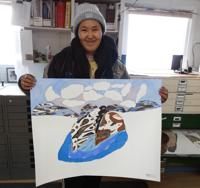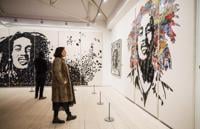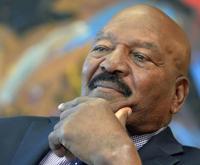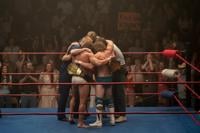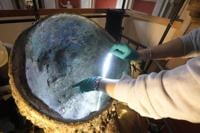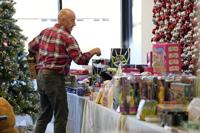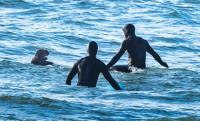It began with an art studio so small and ill-equipped that printmakers opened windows to the Arctic winter to ventilate toxic chemicals.
Now, it's an internationally known wellspring of imagery and imagination that graces the walls and tabletops of Canadians and art-lovers around the world — as well as a business that offers Inuit everything from public housing to small engine repair.
"We're kept pretty busy," said Pauloosie Kowmageak, president of the West Baffin Cooperative, Canada's oldest Indigenous-owned arts organization, celebrating its 65th anniversary this year. It's known in its home community of Kinngait, Nvt., simply as "the co-op," but it's better known as the first of the printmaking studios that brought Inuit vision to the world and gave Canada some of its most iconic art.
Art from Kinngait, formerly Cape Dorset, has appeared on postage stamps such as "The Enchanted Owl" by Kenojuak Ashevak, among others. It has been presented to ambassadors and represented Canada at major global art fairs such as the Venice Biennale.
"It's been an important part of Canadian culture," said Darlene Wight, curator of Inuit art at the Winnipeg Art Gallery, owner of the world's largest collection of such work.
The co-op began in 1959, an outgrowth of efforts to improve the production, quality and marketing of the art Inuit had been making for centuries. Studios such as West Baffin gave Inuk creators a chance to move from carving to the more lucrative field of printmaking.
Those were rough-and-ready days, recalls printmaker Niveaksie Quvianaqtuliaq, who has worked at the studio for 34 years.
"We didn't have any proper equipment," he said. "When we used harsh chemicals, our vent was so weak we had to open windows and doors. In January, by the time all the chemicals were out, you could see your breath."
Not so anymore.
The studio — now, it claims, the longest-running print shop in Canada — is equipped with the latest stonecut, etching, stencil and lithography equipment, as well as a drawing studio. It has a gallery, a restaurant and a retail area in the 1,000-square-metre Kenojuak Cultural Centre.
More than 100 people work there, making it the largest employer in town, said Kowmageak.
"Economically, we help out in the community."
The artists and the printmakers who translate their designs onto paper are almost all local. Many are second or third generation.
"We're happy that it continues within families," Kowmageak said. "We're trying to push it out to the school system as well to keep it going."
Art from West Baffin has changed over the generations, Wight said.
Imagery rooted in traditional activities on the land, ancient myths and the lives of animals is shifting to include elements of modern Inuit life. It's also grown more technically sophisticated, gradually moving from simple silhouettes to incorporate colour and perspective.
"It's becoming more and more diverse," said Wight.
"The subject matter is definitely changing from the more on-the-land life that their parents lived to a more urban outlook. That's what all the younger people are doing — they're not doing hunting scenes."
Over the course of the co-op's life, the art has also achieved international recognition.
In 1999, then-French president Jacques Chirac made a detour to Kinngait to meet artists and make purchases. Wight has curated shows of Inuit art in the European principality of Monaco — attended by Prince Rainier— as well as the Italian city of Verona.
"The Italians think they have the market cornered on art, but it was really fun to see them exploring carvings and prints and drawings and textiles," Wight said.
Wight is currently preparing a show of Kinngait artist Ningiukulu Teevee for London, England. Shows celebrating the co-op's anniversary are currently scheduled in Miami and Fredericton.
West Baffin has become a conduit between life on a remote Arctic island and the rest of the world. International visitors are common — most recently, a delegation from South Korea.
Quvianaqtuliaq has studied at the Nova Scotia Academy of Art and Design and worked with printmakers in Albuquerque, N.M.
"We're around the world now," he said.
"I look back and look around and I can't believe I'm here, working with all the artists. I love my job."
This report by Ďă¸ŰÁůşĎ˛ĘąŇĹĆ×ĘÁĎ was first published Jan. 13, 2024.
Note to readers: This is a corrected story. A previous version said Darlene Wight was preparing a show of Inuit artist Shuvinai Ashoona.


